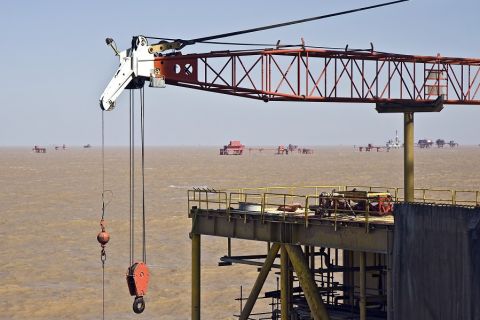
CFE’s criminal investigation targeting WhiteWater could have a chilling effect on other U.S. energy companies looking at opportunities in the country. (Source: Tatoh.rat, A.Punpleng/Shutterstock.com)
WhiteWater Midstream LLC pushed back on July 20 against allegations of corruption leveled by Mexico’s state-operated utility, Comisión Federal de Electricidad (CFE), while experts expressed concern about the risks U.S. energy companies take in conducting business in the country.
The issue is centered around three natural gas contracts between Austin, Texas-based Whitewater and a private company founded by the utility in 2016-2017, during a period of energy reform promoted by Mexico’s then-President Enrique Peña Nieto. On July 16, the CFE said it was investigating possible criminal actions by WhiteWater against its company—CFE International (CFEI), which is based in Houston.
A spokesman for WhiteWater told Hart Energy that the company could not discuss specifics of the contract dispute because the matter is in arbitration, but released this statement:
“CFE’s repeated false statements to the media about WhiteWater follow our initiation of arbitration against CFEI for unpaid amounts owed,” the company said. “Particularly disturbing are the explicit threats from the state-owned enterprise to pursue criminal action on contracts that it sought to renegotiate for months, leveraging its non-payment. WhiteWater will vigorously pursue its contractual rights in arbitration.”
In a statement released on July 16, CFE contended that those agreements “are unfavorable and unbalanced, with leonine clauses and conditions such as that CFE cannot under any circumstances terminate a 15-year gas contract, it cannot penalize the private company under situations of non-compliance in the supply, the amounts of CFE’s guarantees to the company are out of the market and gas volumes are increasing and without being linked to the needs of CFE’s generation plants.”
WhiteWater had been discussing nonpayment of invoices with CFE for months, finally filing for arbitration on July 2. Four days later, on July 6, the Mexico City newspaper El País published an article implying that the deals were corrupt.
‘Potential Risks’
Experts contacted by Hart Energy saw a parallel between WhiteWater’s difficulties and the recent episode involving Talos Energy. On July 2, the Mexican government chose state-owned Pemex to operate the Zama offshore oil field that had been discovered by a consortium led by Houston-based Talos.
The 700 million-barrel field was the first major discovery by foreign companies following the energy reform. The consortium won the E&P contract in 2015.
“[Talos] really did what the prior government wanted done to bring in competition and they really provided leadership through that project,” Tom Petrie, chairman of Petrie Partners, told Hart Energy. “And now the government, in a fairly high-handed way, handed over operatorship to the junior partner, to Pemex.”
Mexican President Andrés Manuel López Obrador (AMLO) has made no secret of his disdain for his predecessor’s energy reform program, maintaining that welcoming foreign companies to invest in the Mexican energy sector benefitted private entities but not the Mexican people.
“Since taking office in December 2018, AMLO has taken varied steps to distance his administration from the energy reform, and that, as a whole, is not necessarily the best of decisions as that has entailed limiting the participation of private firms, whose role is central in strengthening energy security and energy sovereignty,” Adrian Duhalt, postdoctoral fellow in Mexico energy studies at Rice University’s Baker Institute for Public Policy, told Hart Energy.
“However, as we have seen in the past with other companies, the conflict with WhiteWater is not an isolated case,” Duhalt said. “What is more, if AMLO garners enough support in the lower house of Congress to approve his power bill, his government might be heading for more legal disputes.”
Actions such as these can also have a chilling effect on cross-border business between the U.S. and Mexico.
“The Mexican president hasn’t been shy about his stance on increasing control over the nation’s energy sector and reversal of energy reform initiatives,” Emily McClain, senior analyst at Rystad Energy, told Hart Energy.
“The investigation of WhiteWater Midstream is just another example of the potential risks associated with doing business in Mexico,” she said. “The message that continues to be expressed to foreign business is an unwelcome one and we will see this theme persist under the existing administration, continuing to make investors and interested parties more reluctant to work with the country.”
Duhalt agrees, noting that nervousness applies both to those operating in Mexico and those considering doing so.
“Mexico’s approach to energy issues is raising eyebrows at home and abroad, and that means having two different conversations,” he said. “As the impression is that both state-owned firms, CFE and Pemex, are being pampered by the government, companies with a footprint in Mexico are being overly cautious as to compromising additional investments to ongoing projects. Meanwhile, firms in the U.S. looking at business opportunities in Mexico are surely having second thoughts about it.”
Duhalt also noted the potential consequences to Mexican consumers.
“The contracts CFE granted to WhiteWater allegedly involve a significant volume of Mexico’s natural gas imports,” he said. “Regardless of how this conflict ends, and for the sake of Mexican consumers and U.S. producers, imports should not be affected. Is CFE taking the necessary measures to avoid this scenario? It better be.”
Recommended Reading
US Raises Crude Production Growth Forecast for 2024
2024-03-12 - U.S. crude oil production will rise by 260,000 bbl/d to 13.19 MMbbl/d this year, the EIA said in its Short-Term Energy Outlook.
Iraq to Seek Bids for Oil, Gas Contracts April 27
2024-04-18 - Iraq will auction 30 new oil and gas projects in two licensing rounds distributed across the country.
Oceaneering Won $200MM in Manufactured Products Contracts in Q4 2023
2024-02-05 - The revenues from Oceaneering International’s manufactured products contracts range in value from less than $10 million to greater than $100 million.
E&P Highlights: Feb. 5, 2024
2024-02-05 - Here’s a roundup of the latest E&P headlines, including an update on Enauta’s Atlanta Phase 1 project.
CNOOC’s Suizhong 36-1/Luda 5-2 Starts Production Offshore China
2024-02-05 - CNOOC plans 118 development wells in the shallow water project in the Bohai Sea — the largest secondary development and adjustment project offshore China.




